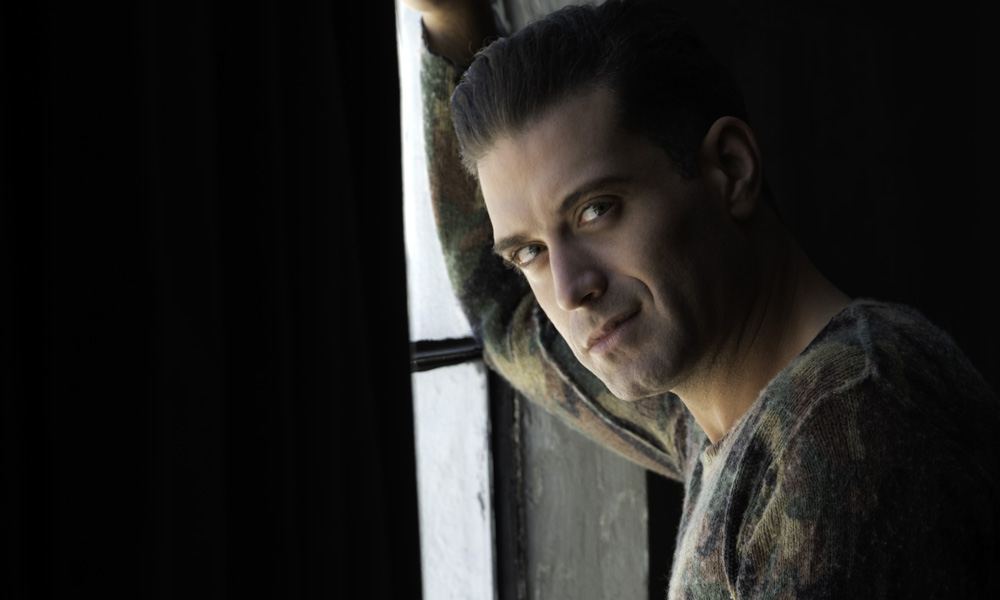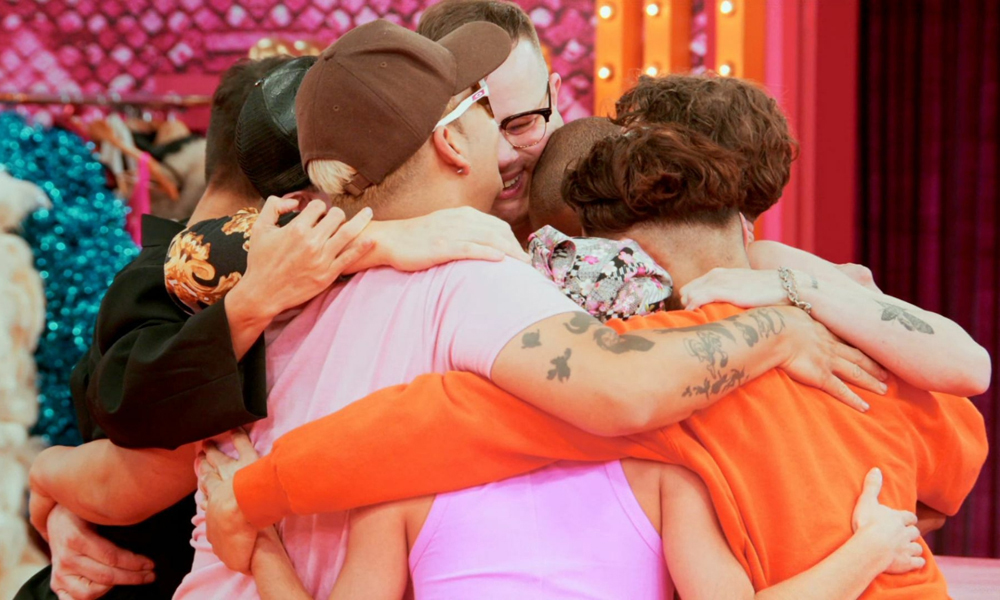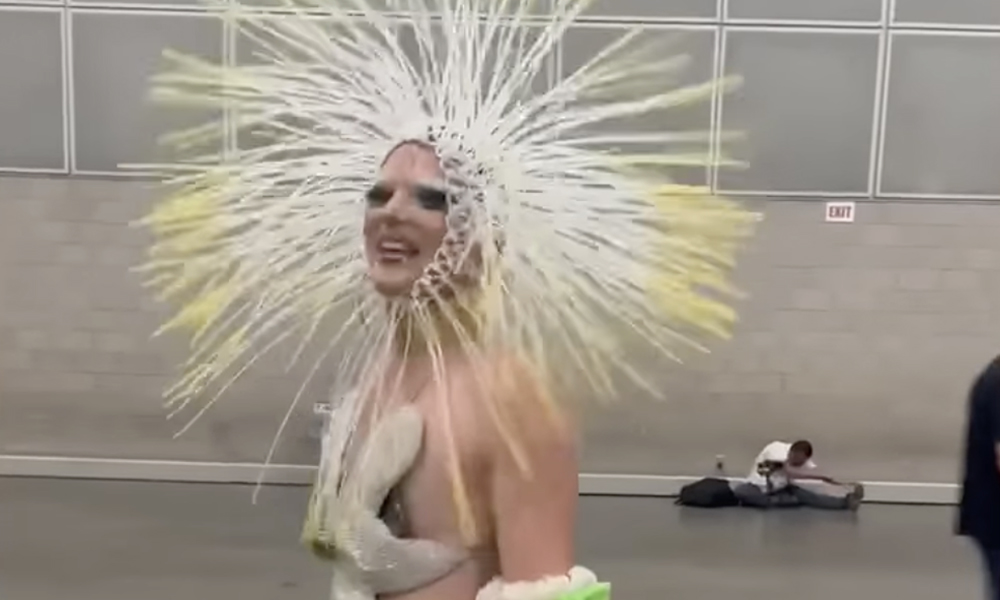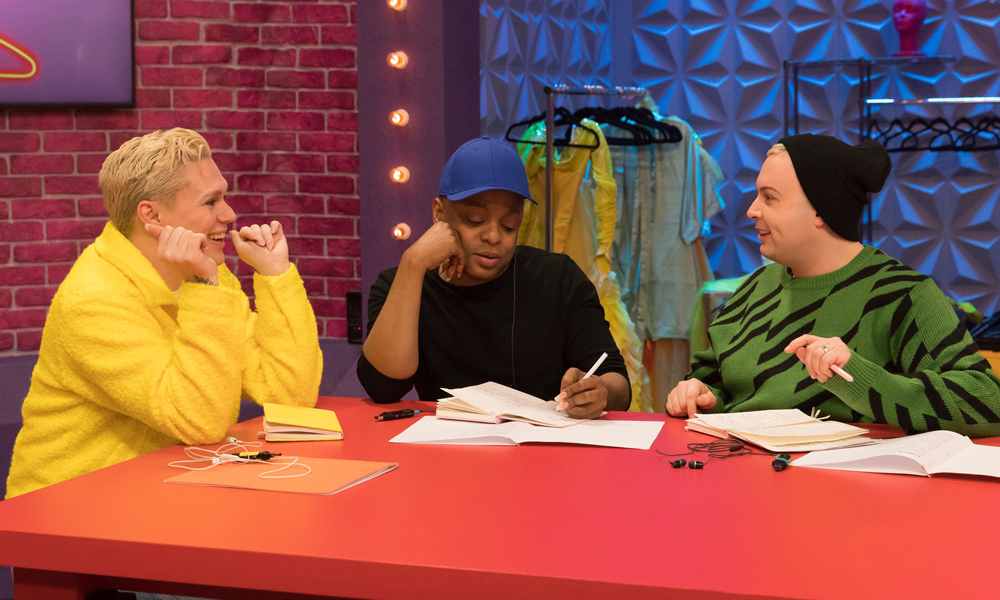Omar Sharif Jr. is making his mark by building on a legacy of acting and activism…
By: Jumol Royes
Photo by: Sean Black
Trying to find one label to define Omar Sharif Jr. is almost next to impossible because there are just too many to choose from.
The Egyptian-Canadian actor, born in Montreal to a Jewish mother and a Muslim father, has starred in films alongside Hollywood heavyweights like Eric Bana and Rooney Mara (The Secret Scripture) and Salma Hayek (11th Hour). Sharif Jr. is the grandson and namesake of legendary film star Omar Sharif, so acting is in his blood.
Activism is also second nature to Sharif Jr. After coming out in 2012 in an article for The Advocate, he’s become known as “the first public personality to ever come out as openly gay in the Arab world.” While he has faced some serious backlash, that hasn’t stopped him from being a vocal advocate for LGBTQ rights around the world; he served as the national spokesperson for GLAAD from 2013 to 2015, and he’s currently an ambassador for the Elizabeth Taylor AIDS Foundation and the Human Rights Foundation.
As if his plate weren’t full enough, Sharif Jr. is adding ‘author’ to his list of credits, with his memoir due to be released this fall. He announced it on Instagram with a post that read in part, “Major milestone: My memoir is finished – ready to bare myself to the world!” A photo of him baring his backside appropriately accompanied the post. It’s hard not to like a guy who knows how to use his assets to get attention!
IN spoke with the globetrotting triple threat about his upcoming TV projects, being gay in Hollywood, Canada’s role in fighting for LGBTQ rights around the world, and his love of all things Schitt’s Creek.
You live in L.A., but you were born in Montreal. What’s your fondest memory of your time spent in Canada?
My best memories are easily going to Queen’s University in Kingston, Ontario…. My experience at Queen’s I felt was very freeing and liberating for me because even though I was still in the closet at home, I came out on campus. And even though it’s more of a conservative campus in a small town, I was fully embraced and accepted by the people around me, including the members of the football team and the lacrosse team, most of whom are still my best friends to this day. And so I only have the fondest memories of being there and being able to discover myself on my own terms.
It was a big deal when you came out. How does it feel to be “the first public personality to ever come out as openly gay in the Arab world”?
It certainly had its challenges…and I have my memoir coming out soon…. I didn’t expect the reaction to be so negative in the Middle East broadly, but I would say it’s a double-edged sword: on one hand, I might have regretted doing it at first because I pay consequences – I can’t go back to Egypt, I couldn’t go to my grandparents’ funeral, I lost a lot of friends, but that comes with the territory, I suppose.
On the other side, still to this day, I receive somewhere between 200 and 1,000 messages a day across various social media platforms. There really is no visibility or representation for LGBT people in the region. But even if I can provide just that [visibility or representation]…. I can’t provide much more than that – I receive a lot of pleas for help and sadly I’m not an immigration expert or a mental health professional; there’s not much more that I can do than just live openly and authentically and try to be an example of someone that’s living their best life and showing that it does get better eventually, as clichéd as that sounds.
You’re also the grandson of Golden Globe Award-winning actor Omar Sharif. What’s it like following in his famous footsteps while trying to make your own mark?
Definitely, a big shadow to walk in…but I’m so proud of the work that he did so it really is such an amazing legacy that he left, because he didn’t just leave a legacy of acting but of activism. Especially later in his life, most of his films and most of the times he spoke publicly were about religious tolerance, so that was something that was really important to him and his last few films touched on that subject. He really used his art to convey a message. That’s what I see as my legacy, my inheritance.
The last four roles that I filmed were about being an LGBT Arab. That’s a story that I can tell and that I can share. It’s amazing that I could learn from his example and do that. Art has a way of cutting through boundaries and borders and walls and opening up minds…. That’s what I learned from him.
Has your career in Hollywood been impacted as a result of being an openly gay actor?
Yeah, for sure…. When I came out, half the criticism that I got out of Egypt was, “He’s doing this for attention to boost his acting career in Hollywood.” Number one, the first thing is, no one comes out to get more work in Hollywood. That’s not how that works, not even a little. So, no, that wasn’t the case. It was about being authentic to who you are and finally just owning up to who you are and embracing yourself and loving yourself for who you are…and that was why I came out. Not to get more work in Hollywood. It doesn’t work [that way]; it’s not a thing. Things that aren’t things for $200, Alex. [Laughs]
…My grandfather did warn me afterward [that] there are going to be less roles because not only are you the gay actor, now you’re the gay Arab actor. But now, I wish he could see – we’re four years after he passed – there are so many of these roles coming out. Every day I get some sort of script for a gay brother, the Arab gay boyfriend, the Arab gay Syrian refugee. There are so many of these stories being told. Hollywood has really picked up the mantle on this, trying to tell more and more diverse stories…. There’s more opportunity to tell these stories.
I’m experiencing a bit of a renaissance this year, in that sense. In the TV show Mélange with Morgan Fairchild, I’m playing a gay Syrian refugee who doesn’t want to leave. I’m now signed on to do The Baker and the Beauty – which is the number one scripted show in Israel – and there I’m playing the Arab love interest of one of the main characters who happens to be Jewish, which I love because it’s an interfaith love story that’s going to film and air in Israel…and it’s an LGBT story. I think it’s just so amazing for the times that the creator, Assi Azar, wrote this into the show in the third season. And then I’m signed on to do a television show called Queen of DeNile, about an Egyptian family in America, and I play the gay cousin of the lead actress…her confidant, her best friend. Times are shifting and, who knows, maybe after coming out, my grandfather was wrong; maybe I will get more work because of this.
Tell us more about Mélange.
Well, they finished filming the pilot so it’s in the pilot season and it’s up to whether or not the distribution channel picks it up. So we have to see if it gets picked up to [be a] series…but it has an amazing cast. Not only does it have Morgan Fairchild, but it has Alex Newell (I love Alex), Perez Hilton, Laith Ashley, Anne Ramsay (who’s become a really close friend of mine), soap stars Gary Donatelli, Robert Newman and David Gregory (who’s so handsome) and Scott Evans (who plays my boyfriend).
The show takes place in a bar in New York and the owner dies suspiciously and the different stakeholders are fighting over the bar. It’s a drama, very stylized, very much like a Dynasty or a Falcon Crest. It’s very dramatic and wonderful; it’s a lot of fun. Very campy.
Shifting gears a little, let’s talk about the work you do around LGBTQ rights. You addressed the Oslo Freedom Forum in Taiwan in advance of that country’s marriage equality referendums last November. How was that experience?
It was special. I’ve spoken [for the LGBTQ community] around the world at this point with the Oslo Freedom Forum as it’s travelled. I really felt a certain amount of pressure on my back because the referendum was happening a few weeks later, and of course I was really disappointed in the result [Taiwanese voters rejected same-sex marriage in a referendum in November 2018] of it afterward. I think the only thing we can do is to bring our messages around the world and tell our story – and if we can change one mind, we still have to consider it a victory, a tiny victory.
What role should countries like Canada play in promoting LGBTQ rights around the world?
I think Canada has an [increasingly] important role to play. I think that other countries are lagging in leadership on this issue, and I think the same way that in some ways I have a role to play when I stand up and speak for LGBT Egyptians, Canada has a role to play on the world stage.
…And there are still problems in Canada – let’s not say everything’s perfect for the LGBTQ community. The rates of bullying have remained static, the rates of suicide have stayed stagnant, there are still issues of trans-related violence, there are still a lot of issues. But I think Canada can be that shining example of progress, or working towards it, and showing that…society is not going to regress if you grant equal rights to LGBT people. There’s not going to be a breakdown of society.… If anything, it’s going to make the country stronger, because stronger families make for stronger communities and stronger societies.
You mentioned your memoir earlier.… What can we expect from it?
It’s going to be coming out this fall.… I’ve really opened up to it and there are going to be a lot of surprises: not only for people that don’t know me but even for my family members who are ultimately going yo read it.
Stories of my grandparents, syories of my family – unknown stories, stories about myself and coming out and what it was like discovering myself throughout the years, stories about hypocrisy in the Middle East and some of these ‘moral’ regimes in which I had some experiences including…being held against my will and sexual abuse, stories about Hollywood, about the Me Too movement and [about] my experiences with some of these figures that are coming up in the press – and I’m so glad that people are finally calling them on it because I was too afraid to for years…and [about] my thoughts on activism today and whether or not it’s going in a good or bad direction generally. Whether we’re actually succeeding or whether we’re [actually] just going after each other.
…It’s not just a collection of stories; it really is one narrative that goes full circle and brings up a whole bunch of, I think, salient topics today.
Are you binge-watching anything? Enquiring minds want to know…
Yeah, I mean I have to say that Schitt’s Creek is probably my favourite show on television.… And it reminds me of Kingston, it reminds me of being at Queen’s University, it reminds me of Canada, it reminds me of home.
—
JUMOL ROYES is a Toronto-based writer, content creator and communications strategist with a keen interest in personal development and transformation. Follow him on Twitter at @Jumol.

Leading Man: Omar Sharif Jr.
Related Articles
RuPaul’s Drag Race All Stars Season 9 Episode 12 Recap: Grand Finale Variety Extravaganza: Part 2
The results of the lipstick vote are revealed and three final queens battle for the all star crown and title. Actress Connie Britton is a guest judge
Willam Was Removed From DragCon 2024
Now Willam is speaking out saying that they were escorted out of the venue by 11 cops and security guards
Canada’s Drag Race Canada vs The World Season 2 Episode 1 RECAP: Drag Pop
Nine queens from international Drag Race competitions compete for a worldwide title. Musician Charlotte Cardin is a guest judge





POST A COMMENT